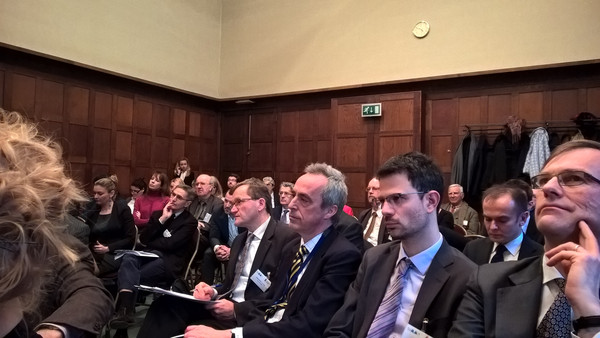
Working Group: E, Thursday 28th January 2016, 18.30-19.45 pm
Speakers: Emmanuel Mourlon-Druol, University of Glasgow and Giorgio Maganza, Council of the European Council, Legal Service
Rapporteur: Alina Thieme, University of Cologne
In working group E Emmanuel Mourlon-Druol (University of Glasgow) and Giorgio Maganza (Council of the European Union, Legal Service) examined the trajectory of the European Council as a key institution by referring to the characters and political changes in the European Council’s history. The discussion was chaired by Stephen Haseler (London Met University) and discussed by Yann-Sven Rittelmeyer (Université libre de Bruxelles).
Emmanuel Mourlon-Druol introduced into the debate by presenting his paper ‘Steering Europe: Explaining the Rise of the European Council, 1975 – 1986’. The aim of this paper was to identify the key factors that led to the increasing stability of the European Council between its foundation in 1974 and the signing of the Single European Act in 1986. To accomplish this, Emmanuel Mourlon-Druol examined four factors which contributed to a smooth and rapid emergence of the institution. In the context of globalisation, he argued, meetings of the Heads of State or Government gained in importance as they had to handle different issues in the 1970ies. The macroeconomic situation at that time, the political cooperation as well as the future of the European Economic Community were three important factors leading to the rise of the European Council as a stable institution. Moreover, he argued the public also had an important impact on the development of the European Council. On the one hand, the number of journalists at the meetings increased, and on the other hand, the meetings took place in the capitals of the member states. Consequently, the Heads of State of Government brought the European Council closer to the citizens which also led to an increasing stability of the institution at that time.
Giorgio Maganza then contributed to the debate by giving insights in the evolution of the European Council from a legal point of view. He stressed that the European Council has not been transformed by external factors, but transformed itself over time as a response to political changes. In the 1960ies and the beginning of the 1970ies, a period of summit conferences, two important decisions were taken by the Heads of States or Government: On the one hand, the strengthening of the European Parliament and on the other, the creation of the European Council. Giorgio Maganza characterized these two decisions as a ‘package deal’ of the Heads of State or Government. After its formation in 1974, the European Council found its place in the treaties with the Single European Act in 1986. The Single European Act provided that the Heads of State or Government have to meet at least twice a year. After briefly explaining the European Council’s increasing importance in external actions during the 1980ies, Giorgio Maganza then put emphasis on the changes that came along with the Lisbon Treaty in 2009. Since the Lisbon Treaty, the foreign ministers are excluded from the European Council meetings and the office of the permanent president replaces the rotating presidency. Moreover, due to its increasing importance in crisis solving, the European Council established itself as a key player in European policy-making.
In the following debate, considerable attention was inter alia payed to the paper of Emmanuel Mourlon-Druol. Initially, Yann-Sven Rittelmeyer questioned how Emmanuel Mourlon-Druol explains the supranational and the intergovernmental logic of the European Council as this institution cannot only be considered as an intergovernmental actor. He further focused on the explanatory power of the four factors and questioned to what extent they are able to explain the growing stability of the European Council. Yann-Sven Rittelmeyer argued that the repetition of the European Council meetings might explain its increasing stability between 1975 and 1986, the impact of the public, however, does not. According to him, this contradicts to the so-called ‘Club-Spirit’, an idea of Helmut Schmidt and Valéry Giscard d’Estaing, and consequently, had a negative impact on the development of the European Council. Prof Wessels also contributed to the debate by suggesting a focus on persons who influenced the development of the institution, like François Mitterrand, as well as on the power relationship between smaller and bigger member states as these factors led to a high degree of stability of the European Council.


